
llama-github
Llama-github is an open-source Python library that empowers LLM Chatbots, AI Agents, and Auto-dev Solutions to conduct Agentic RAG from actively selected GitHub public projects. It Augments through LLMs and Generates context for any coding question, in order to streamline the development of sophisticated AI-driven applications.
Stars: 285
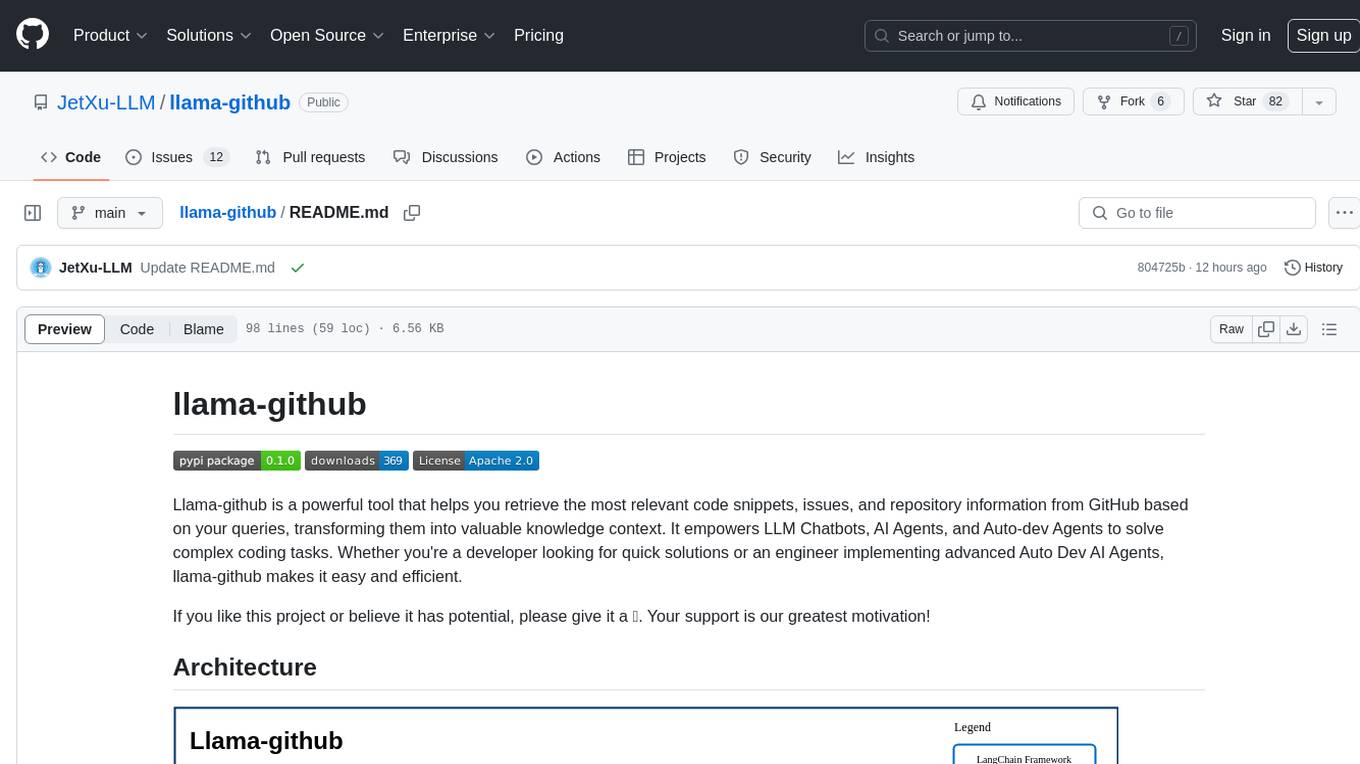
Llama-github is a powerful tool that helps retrieve relevant code snippets, issues, and repository information from GitHub based on queries. It empowers AI agents and developers to solve coding tasks efficiently. With features like intelligent GitHub retrieval, repository pool caching, LLM-powered question analysis, and comprehensive context generation, llama-github excels at providing valuable knowledge context for development needs. It supports asynchronous processing, flexible LLM integration, robust authentication options, and logging/error handling for smooth operations and troubleshooting. The vision is to seamlessly integrate with GitHub for AI-driven development solutions, while the roadmap focuses on empowering LLMs to automatically resolve complex coding tasks.
README:
Llama-github is a powerful tool that helps you retrieve(based on Agentic RAG) the most relevant code snippets, issues, and repository information from GitHub based on your queries, transforming them into valuable knowledge context. It empowers LLM Chatbots, AI Agents, and Auto-dev Agents to solve complex coding tasks. Whether you're a developer looking for quick solutions or an engineer implementing advanced Auto Dev AI Agents, llama-github makes it easy and efficient.
If you like this project or believe it has potential, please give it a ⭐️. Your support is our greatest motivation!
pip install llama-github
Here's a simple example of how to use llama-github:
from llama_github import GithubRAG
# Initialize GithubRAG with your credentials
github_rag = GithubRAG(
github_access_token="your_github_access_token",
openai_api_key="your_openai_api_key", # Optional in Simple Mode
jina_api_key="your_jina_api_key" # Optional - unless you want high concurrency production deployment (s.jina.ai API will be used in llama-github)
)
# Retrieve context for a coding question (simple_mode is default set to False)
query = "How to create a NumPy array in Python?"
context = github_rag.retrieve_context(
query, # In professional mode, one query will take nearly 1 min to generate final contexts. You could set log level to INFO to monitor the retrieval progress
# simple_mode = True
)
print(context)For more advanced usage and examples, please refer to the documentation.
-
🔍 Intelligent GitHub Retrieval: Harness the power of llama-github to retrieve highly relevant code snippets, issues, and repository information from GitHub based on user queries. Our advanced retrieval techniques ensure you find the most pertinent information quickly and efficiently.
-
⚡ Repository Pool Caching: Llama-github has an innovative repository pool caching mechanism. By caching repositories (including READMEs, structures, code, and issues) across threads, llama-github significantly accelerates GitHub search retrieval efficiency and minimizes the consumption of GitHub API tokens. Deploy llama-github in multi-threaded production environments with confidence, knowing that it will perform optimally and save you valuable resources.
-
🧠 LLM-Powered Question Analysis: Leverage state-of-the-art language models to analyze user questions and generate highly effective search strategies and criteria. Llama-github intelligently breaks down complex queries, ensuring that you retrieve the most relevant information from GitHub's vast repository network.
-
📚 Comprehensive Context Generation: Generate rich, contextually relevant answers by seamlessly combining information retrieved from GitHub with the reasoning capabilities of advanced language models. Llama-github excels at handling even the most complex and lengthy questions, providing comprehensive and insightful responses that include extensive context to support your development needs.
-
🚀 Asynchronous Processing Excellence: Llama-github is built from the ground up to leverage the full potential of asynchronous programming. With meticulously implemented asynchronous mechanisms woven throughout the codebase, llama-github can handle multiple requests concurrently, significantly boosting overall performance. Experience the difference as llama-github efficiently manages high-volume workloads without compromising on speed or quality.
-
🔧 Flexible LLM Integration: Easily integrate llama-github with various LLM providers, embedding models, and reranking models to tailor the library's capabilities to your specific requirements. Our extensible architecture allows you to customize and enhance llama-github's functionality, ensuring that it adapts seamlessly to your unique development environment.
-
🔒 Robust Authentication Options: Llama-github supports both personal access tokens and GitHub App authentication, providing you with the flexibility to integrate it into different development setups. Whether you're an individual developer or working within an organizational context, llama-github has you covered with secure and reliable authentication mechanisms.
-
🛠️ Logging and Error Handling: We understand the importance of smooth operations and easy troubleshooting. That's why llama-github comes equipped with comprehensive logging and error handling mechanisms. Gain deep insights into the library's behavior, quickly diagnose issues, and maintain a stable and reliable development workflow.
If you find llama-github useful, you might also be interested in our AI-powered GitHub PR review assistant, LlamaPReview. It's designed to complement your development workflow and further enhance code quality.
- 🚀 One-click installation, zero configuration required, fully auto-run
- 💯 Currently free to use - no credit card or payment info needed
- 🧠 AI-powered, automatic PR reviews with deep code understanding
- 🌐 Supports multiple programming languages
LlamaPReview utilizes llama-github's advanced context retrieval and LLM-powered analysis to provide intelligent, context-aware code reviews. It's like having a senior developer, armed with the full context of your repository, review every PR automatically!
👉 Install LlamaPReview Now (Free)
By using llama-github for context retrieval and LlamaPReview for code reviews, you can create a powerful, AI-enhanced development environment.
Our vision is to become a pivotal module in the future of AI-driven development solutions, seamlessly integrating with GitHub to empower LLMs in automatically resolving complex coding tasks.
For a detailed view of our project roadmap, please visit our Project Roadmap.
We would like to express our gratitude to the following open-source projects for their support and contributions:
- LangChain: For providing the foundational framework that empowers the LLM prompting and processing capabilities in llama-github.
- Jina.ai: For offering s.jina.ai API and open source reranker and embedding models that enhance the accuracy and relevance of the generated contexts in llama-github.
Their contributions have been instrumental in the development of llama-github, and we highly recommend checking out their projects for more innovative solutions.
We welcome contributions to llama-github! Please see our contributing guidelines for more information.
This project is licensed under the terms of the Apache 2.0 license. See the LICENSE file for more details.
If you have any questions, suggestions, or feedback, please feel free to reach out to us at Jet Xu's email.
Thank you for choosing llama-github! We hope this library enhances your AI development experience and helps you build powerful applications with ease.
For Tasks:
Click tags to check more tools for each tasksFor Jobs:
Alternative AI tools for llama-github
Similar Open Source Tools

llama-github
Llama-github is a powerful tool that helps retrieve relevant code snippets, issues, and repository information from GitHub based on queries. It empowers AI agents and developers to solve coding tasks efficiently. With features like intelligent GitHub retrieval, repository pool caching, LLM-powered question analysis, and comprehensive context generation, llama-github excels at providing valuable knowledge context for development needs. It supports asynchronous processing, flexible LLM integration, robust authentication options, and logging/error handling for smooth operations and troubleshooting. The vision is to seamlessly integrate with GitHub for AI-driven development solutions, while the roadmap focuses on empowering LLMs to automatically resolve complex coding tasks.
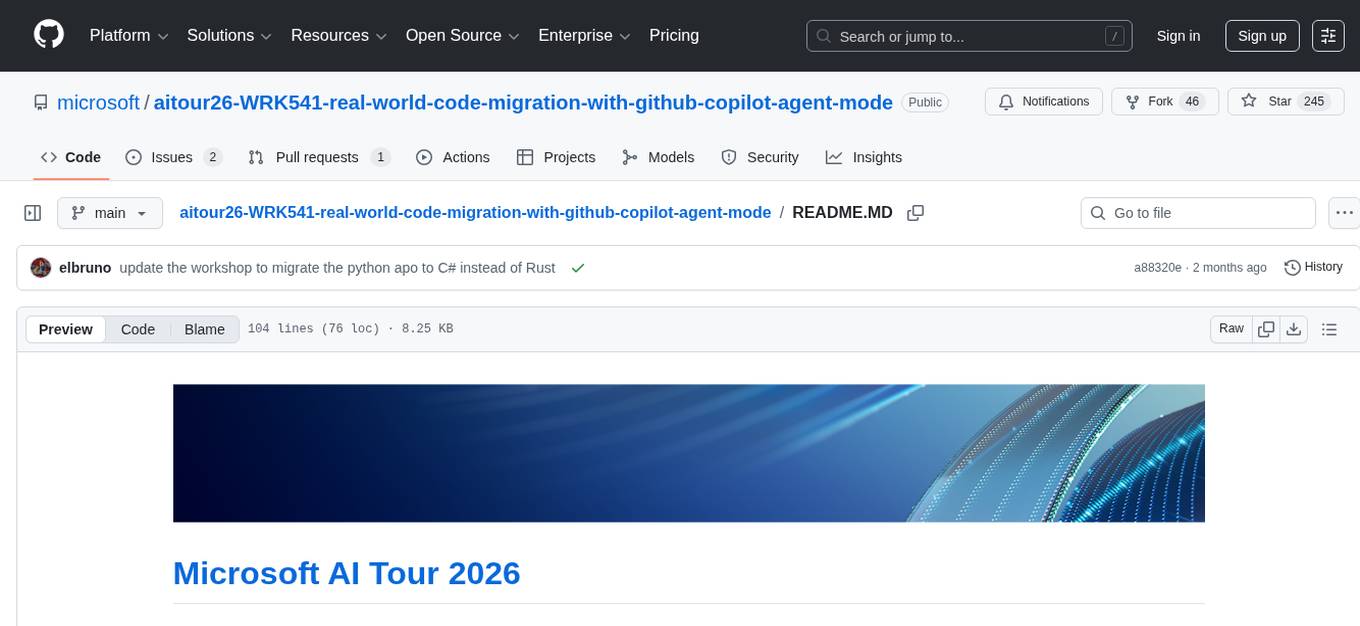
aitour26-WRK541-real-world-code-migration-with-github-copilot-agent-mode
Microsoft AI Tour 2026 WRK541 is a workshop focused on real-world code migration using GitHub Copilot Agent Mode. The session is designed for technologists interested in applying AI pair-programming techniques to challenging tasks like migrating or translating code between different programming languages. Participants will learn advanced GitHub Copilot techniques, differences between Python and C#, JSON serialization and deserialization in C#, developing and validating endpoints, integrating Swagger/OpenAPI documentation, and writing unit tests with MSTest. The workshop aims to help users gain hands-on experience in using GitHub Copilot for real-world code migration scenarios.

AgentUp
AgentUp is an active development tool that provides a developer-first agent framework for creating AI agents with enterprise-grade infrastructure. It allows developers to define agents with configuration, ensuring consistent behavior across environments. The tool offers secure design, configuration-driven architecture, extensible ecosystem for customizations, agent-to-agent discovery, asynchronous task architecture, deterministic routing, and MCP support. It supports multiple agent types like reactive agents and iterative agents, making it suitable for chatbots, interactive applications, research tasks, and more. AgentUp is built by experienced engineers from top tech companies and is designed to make AI agents production-ready, secure, and reliable.

CodeFuse-muAgent
CodeFuse-muAgent is a Multi-Agent framework designed to streamline Standard Operating Procedure (SOP) orchestration for agents. It integrates toolkits, code libraries, knowledge bases, and sandbox environments for rapid construction of complex Multi-Agent interactive applications. The framework enables efficient execution and handling of multi-layered and multi-dimensional tasks.

morphik-core
Morphik is an AI-native toolset designed to help developers integrate context into their AI applications by providing tools to store, represent, and search unstructured data. It offers features such as multimodal search, fast metadata extraction, and integrations with existing tools. Morphik aims to address the challenges of traditional AI approaches that struggle with visually rich documents and provide a more comprehensive solution for understanding and processing complex data.

coze-studio
Coze Studio is an all-in-one AI agent development tool that offers the most convenient AI agent development environment, from development to deployment. It provides core technologies for AI agent development, complete app templates, and build frameworks. Coze Studio aims to simplify creating, debugging, and deploying AI agents through visual design and build tools, enabling powerful AI app development and customized business logic. The tool is developed using Golang for the backend, React + TypeScript for the frontend, and follows microservices architecture based on domain-driven design principles.

mindsdb
MindsDB is a platform for customizing AI from enterprise data. You can create, serve, and fine-tune models in real-time from your database, vector store, and application data. MindsDB "enhances" SQL syntax with AI capabilities to make it accessible for developers worldwide. With MindsDB’s nearly 200 integrations, any developer can create AI customized for their purpose, faster and more securely. Their AI systems will constantly improve themselves — using companies’ own data, in real-time.

mastra
Mastra is an opinionated Typescript framework designed to help users quickly build AI applications and features. It provides primitives such as workflows, agents, RAG, integrations, syncs, and evals. Users can run Mastra locally or deploy it to a serverless cloud. The framework supports various LLM providers, offers tools for building language models, workflows, and accessing knowledge bases. It includes features like durable graph-based state machines, retrieval-augmented generation, integrations, syncs, and automated tests for evaluating LLM outputs.

CSGHub
CSGHub is an open source, trustworthy large model asset management platform that can assist users in governing the assets involved in the lifecycle of LLM and LLM applications (datasets, model files, codes, etc). With CSGHub, users can perform operations on LLM assets, including uploading, downloading, storing, verifying, and distributing, through Web interface, Git command line, or natural language Chatbot. Meanwhile, the platform provides microservice submodules and standardized OpenAPIs, which could be easily integrated with users' own systems. CSGHub is committed to bringing users an asset management platform that is natively designed for large models and can be deployed On-Premise for fully offline operation. CSGHub offers functionalities similar to a privatized Huggingface(on-premise Huggingface), managing LLM assets in a manner akin to how OpenStack Glance manages virtual machine images, Harbor manages container images, and Sonatype Nexus manages artifacts.

supervisely
Supervisely is a computer vision platform that provides a range of tools and services for developing and deploying computer vision solutions. It includes a data labeling platform, a model training platform, and a marketplace for computer vision apps. Supervisely is used by a variety of organizations, including Fortune 500 companies, research institutions, and government agencies.
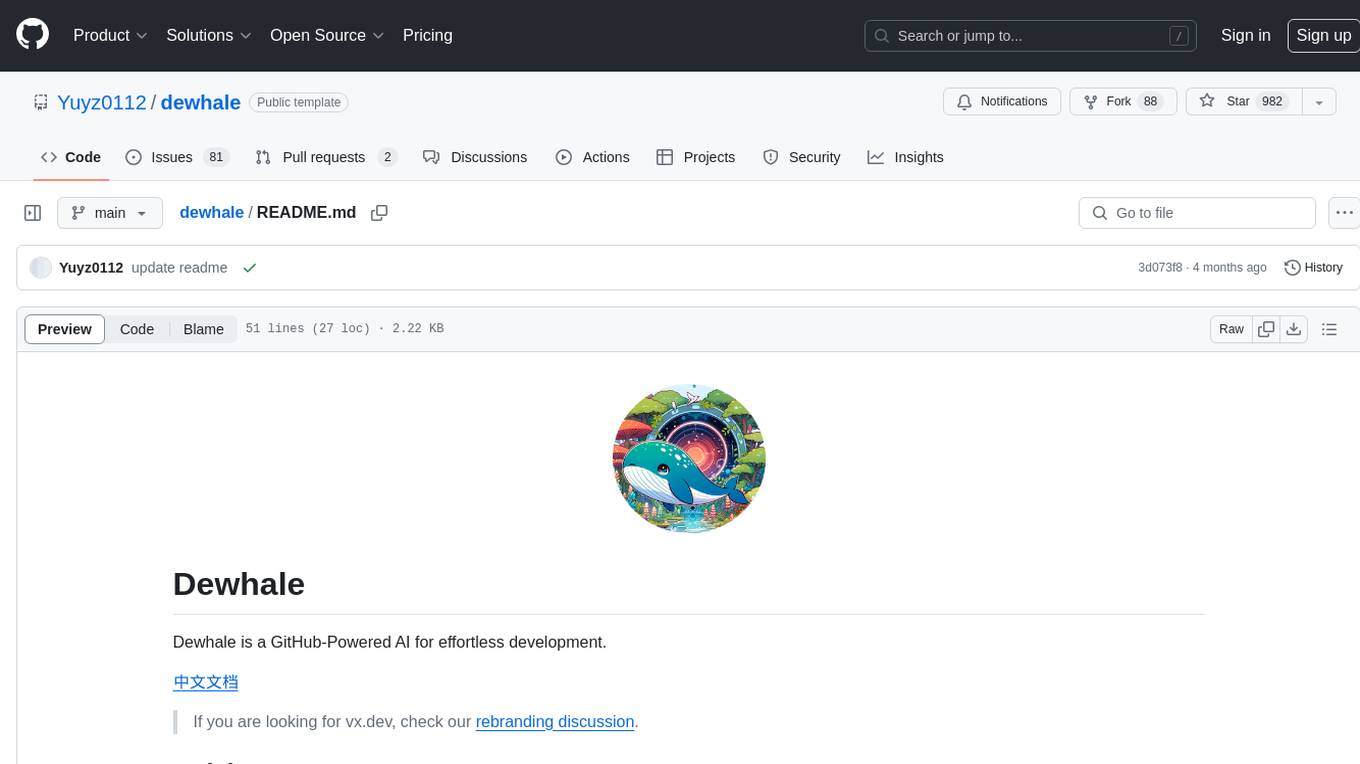
dewhale
Dewhale is a GitHub-Powered AI tool designed for effortless development. It utilizes prompt engineering techniques under the GPT-4 model to issue commands, allowing users to generate code with lower usage costs and easy customization. The tool seamlessly integrates with GitHub, providing version control, code review, and collaborative features. Users can join discussions on the design philosophy of Dewhale and explore detailed instructions and examples for setting up and using the tool.
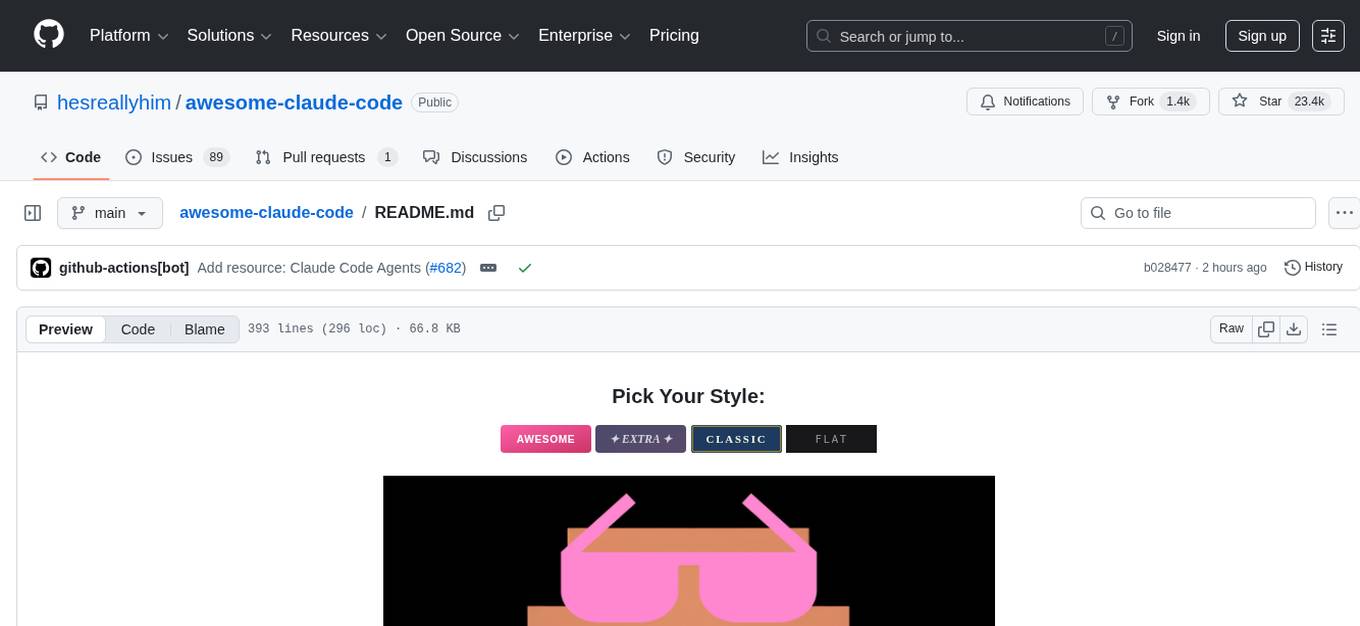
awesome-claude-code
Awesome Claude Code is a curated list of slash-commands, CLAUDE.md files, CLI tools, and other resources for enhancing your Claude Code workflow. It includes a variety of agent skills, workflows, tooling, hooks, slash-commands, and more to help developers improve their coding experience using Claude Code, a CLI-based coding assistant from Anthropic. The list covers a wide range of topics such as AI development, project management, code analysis, documentation, CI/CD, and domain-specific projects. Whether you are a beginner or an experienced developer, this repository provides valuable resources to enhance your coding skills and workflow with Claude Code.
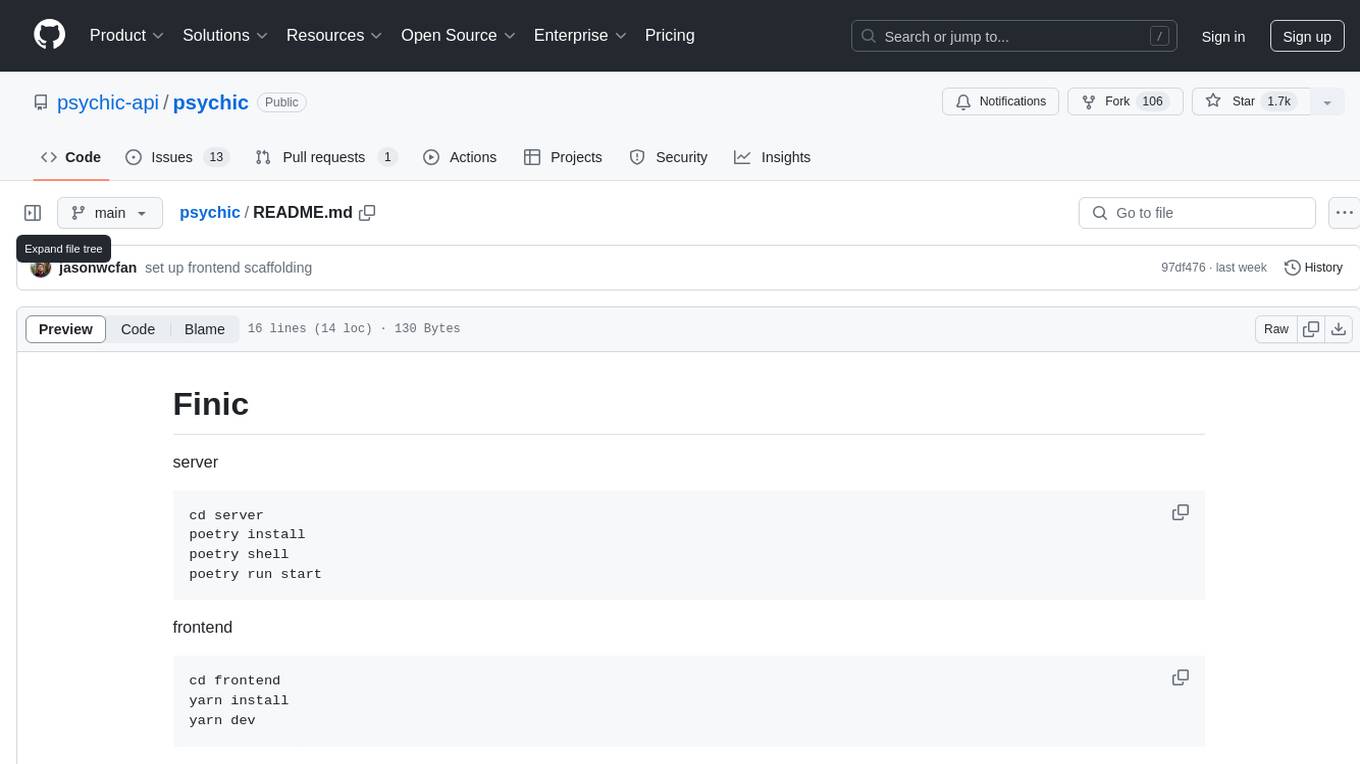
psychic
Psychic is a tool that provides a platform for users to access psychic readings and services. It offers a range of features such as tarot card readings, astrology consultations, and spiritual guidance. Users can connect with experienced psychics and receive personalized insights and advice on various aspects of their lives. The platform is designed to be user-friendly and intuitive, making it easy for users to navigate and explore the different services available. Whether you're looking for guidance on love, career, or personal growth, Psychic has you covered.
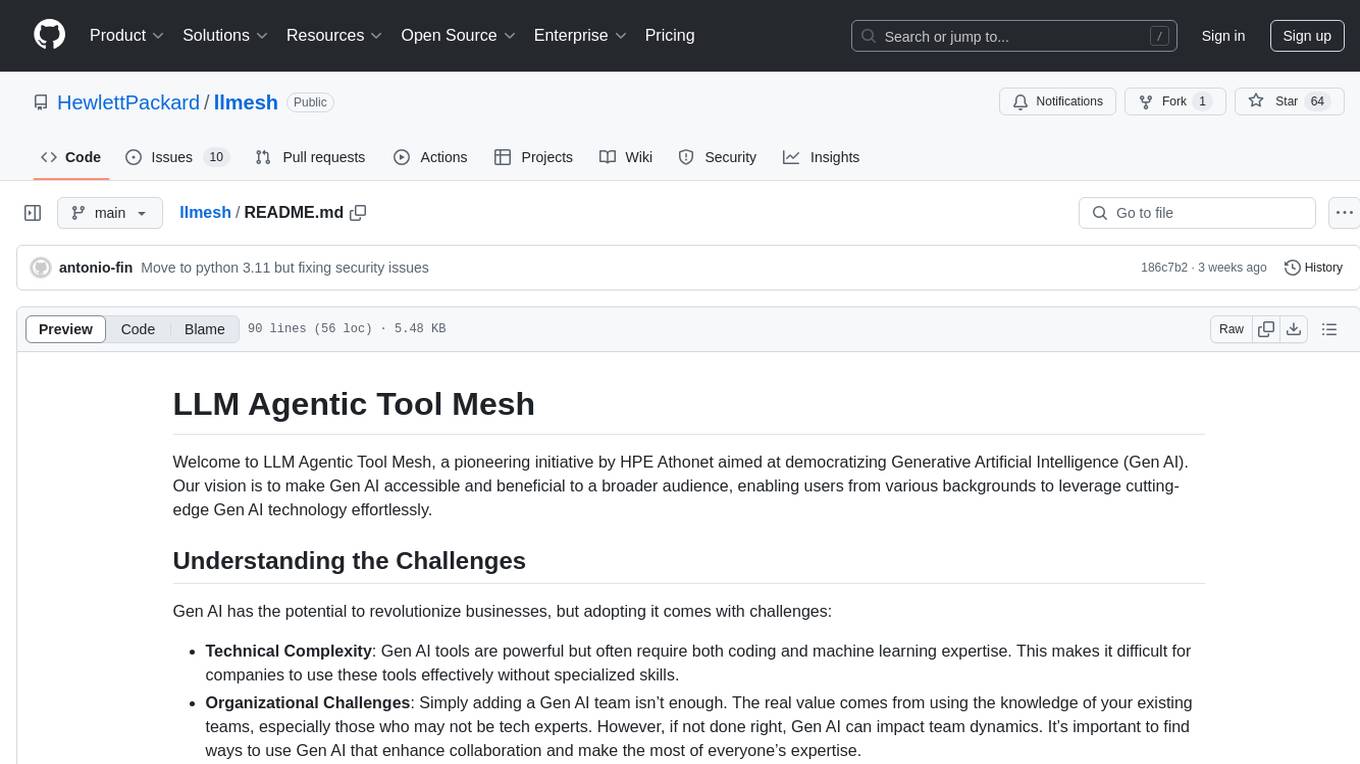
llmesh
LLM Agentic Tool Mesh is a platform by HPE Athonet that democratizes Generative Artificial Intelligence (Gen AI) by enabling users to create tools and web applications using Gen AI with Low or No Coding. The platform simplifies the integration process, focuses on key user needs, and abstracts complex libraries into easy-to-understand services. It empowers both technical and non-technical teams to develop tools related to their expertise and provides orchestration capabilities through an agentic Reasoning Engine based on Large Language Models (LLMs) to ensure seamless tool integration and enhance organizational functionality and efficiency.
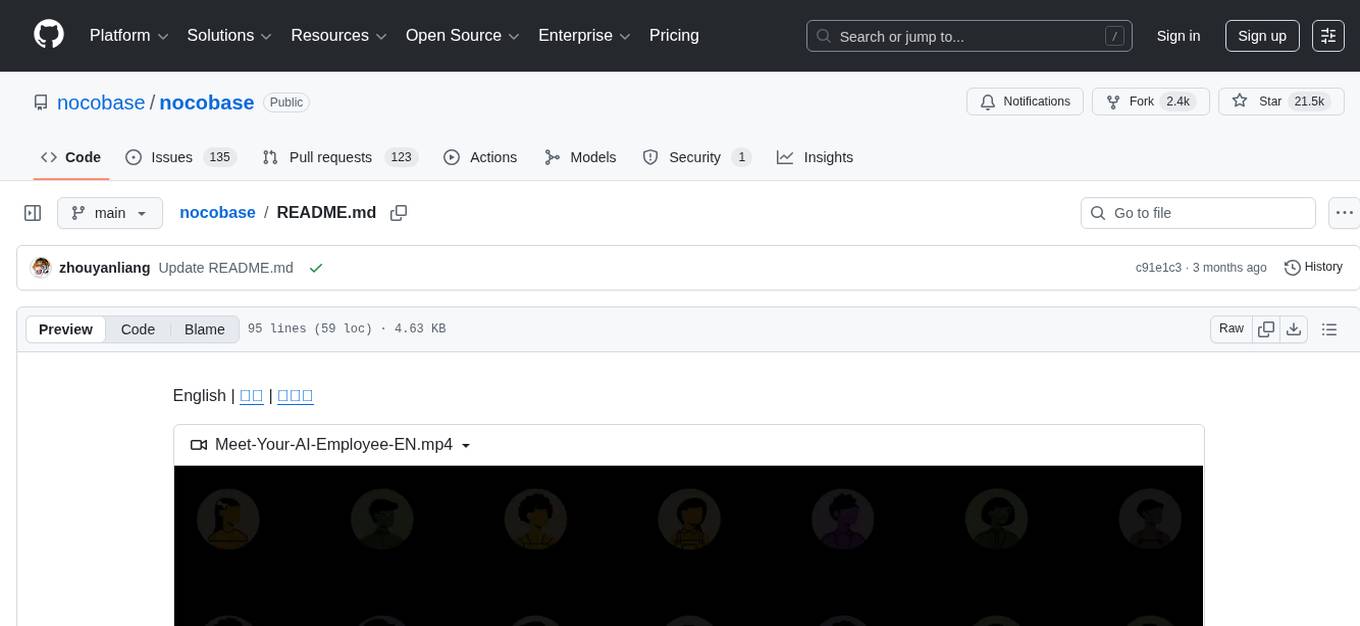
nocobase
NocoBase is an extensible AI-powered no-code platform that offers total control, infinite extensibility, and AI collaboration. It enables teams to adapt quickly and reduce costs without the need for years of development or wasted resources. With NocoBase, users can deploy the platform in minutes and have complete control over their projects. The platform is data model-driven, allowing for unlimited possibilities by decoupling UI and data structure. It integrates AI capabilities seamlessly into business systems, enabling roles such as translator, analyst, researcher, or assistant. NocoBase provides a simple and intuitive user experience with a 'what you see is what you get' approach. It is designed for extension through its plugin-based architecture, allowing users to customize and extend functionalities easily.
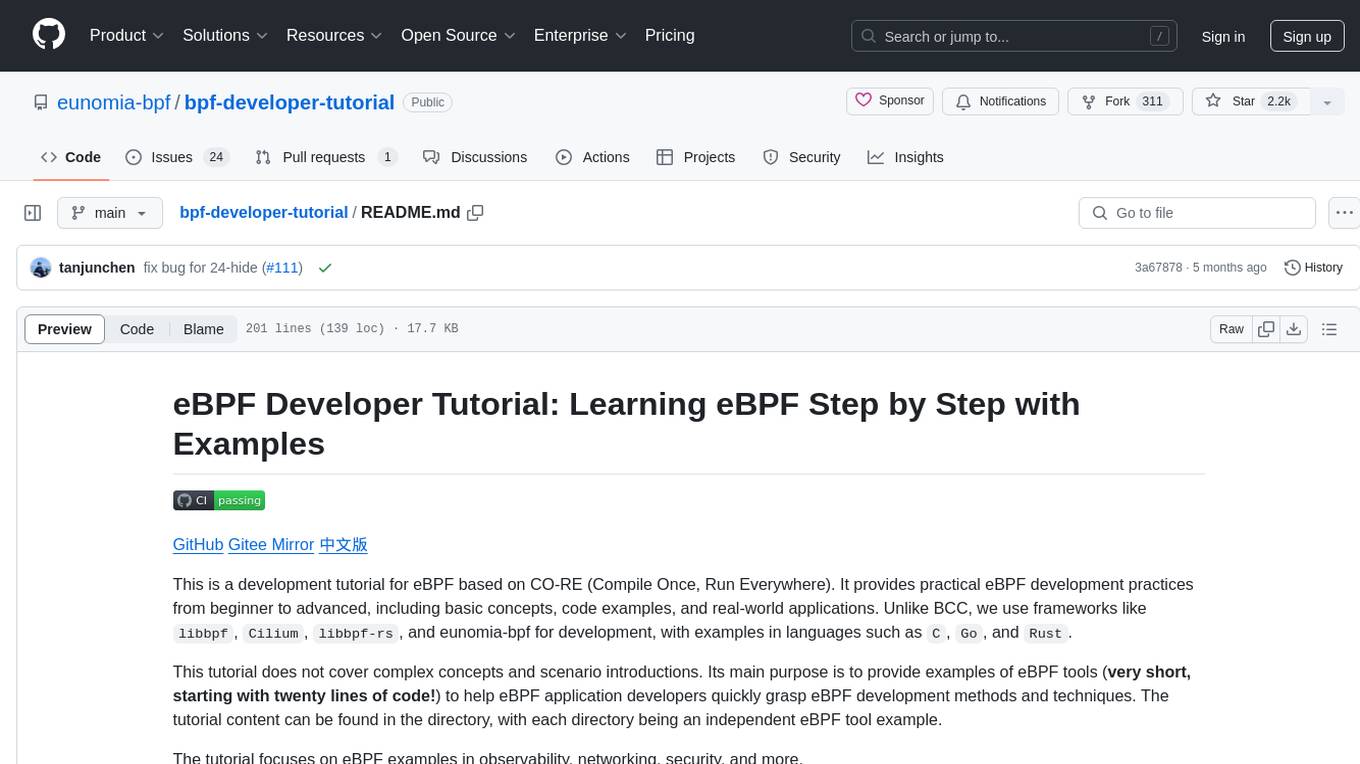
bpf-developer-tutorial
This is a development tutorial for eBPF based on CO-RE (Compile Once, Run Everywhere). It provides practical eBPF development practices from beginner to advanced, including basic concepts, code examples, and real-world applications. The tutorial focuses on eBPF examples in observability, networking, security, and more. It aims to help eBPF application developers quickly grasp eBPF development methods and techniques through examples in languages such as C, Go, and Rust. The tutorial is structured with independent eBPF tool examples in each directory, covering topics like kprobes, fentry, opensnoop, uprobe, sigsnoop, execsnoop, exitsnoop, runqlat, hardirqs, and more. The project is based on libbpf and frameworks like libbpf, Cilium, libbpf-rs, and eunomia-bpf for development.
For similar tasks

llama-github
Llama-github is a powerful tool that helps retrieve relevant code snippets, issues, and repository information from GitHub based on queries. It empowers AI agents and developers to solve coding tasks efficiently. With features like intelligent GitHub retrieval, repository pool caching, LLM-powered question analysis, and comprehensive context generation, llama-github excels at providing valuable knowledge context for development needs. It supports asynchronous processing, flexible LLM integration, robust authentication options, and logging/error handling for smooth operations and troubleshooting. The vision is to seamlessly integrate with GitHub for AI-driven development solutions, while the roadmap focuses on empowering LLMs to automatically resolve complex coding tasks.
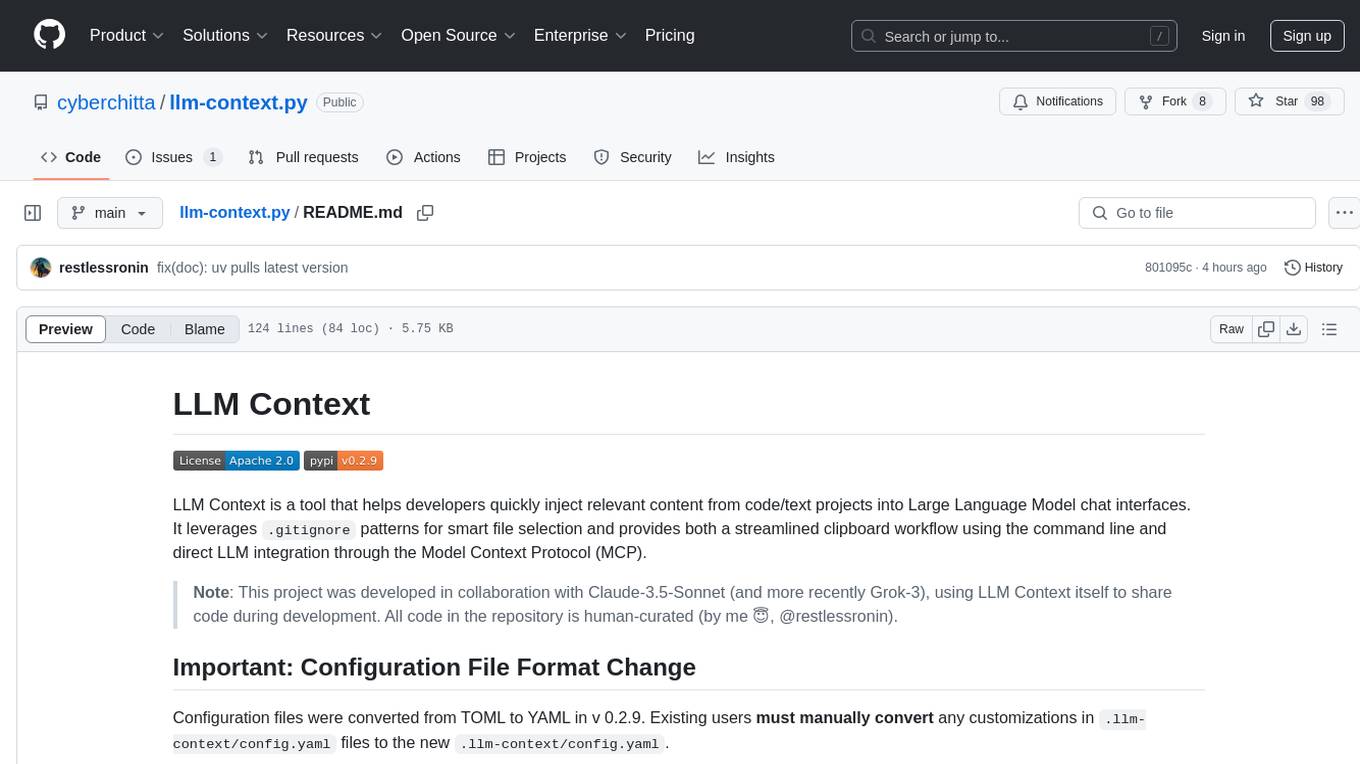
llm-context.py
LLM Context is a tool designed to assist developers in quickly injecting relevant content from code/text projects into Large Language Model chat interfaces. It leverages `.gitignore` patterns for smart file selection and offers a streamlined clipboard workflow using the command line. The tool also provides direct integration with Large Language Models through the Model Context Protocol (MCP). LLM Context is optimized for code repositories and collections of text/markdown/html documents, making it suitable for developers working on projects that fit within an LLM's context window. The tool is under active development and aims to enhance AI-assisted development workflows by harnessing the power of Large Language Models.
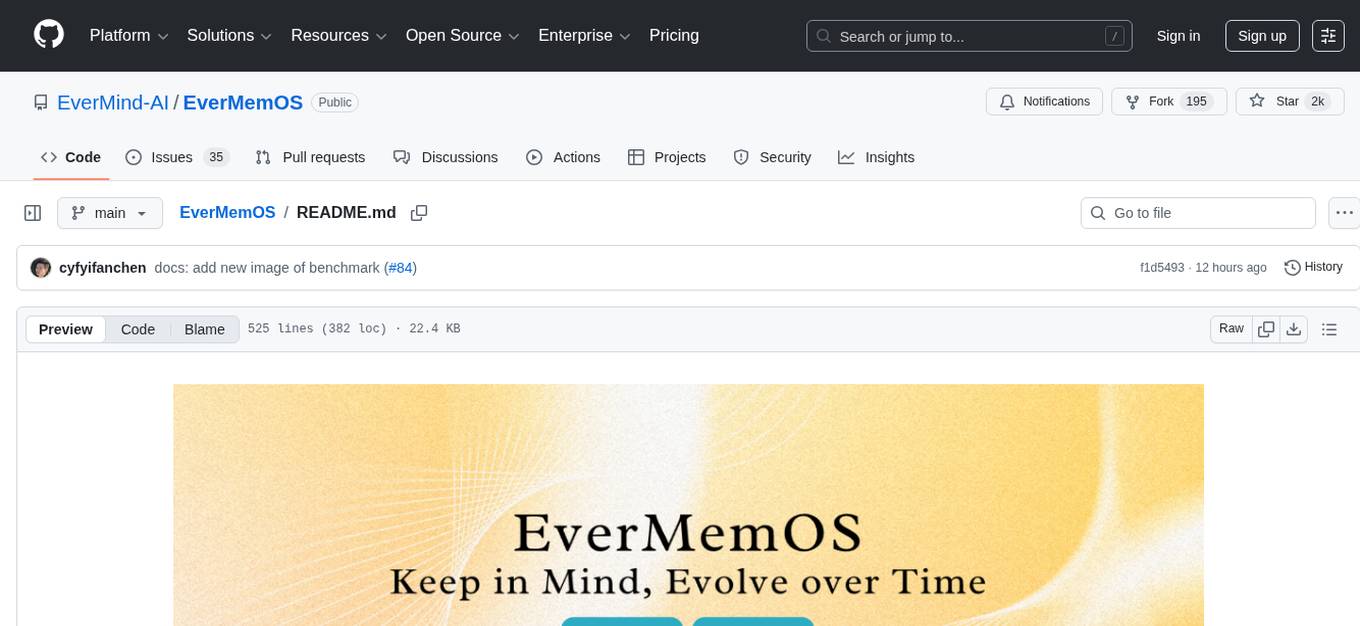
EverMemOS
EverMemOS is an AI memory system that enables AI to not only remember past events but also understand the meaning behind memories and use them to guide decisions. It achieves 93% reasoning accuracy on the LoCoMo benchmark by providing long-term memory capabilities for conversational AI agents through structured extraction, intelligent retrieval, and progressive profile building. The tool is production-ready with support for Milvus vector DB, Elasticsearch, MongoDB, and Redis, and offers easy integration via a simple REST API. Users can store and retrieve memories using Python code and benefit from features like multi-modal memory storage, smart retrieval mechanisms, and advanced techniques for memory management.
For similar jobs

sweep
Sweep is an AI junior developer that turns bugs and feature requests into code changes. It automatically handles developer experience improvements like adding type hints and improving test coverage.

teams-ai
The Teams AI Library is a software development kit (SDK) that helps developers create bots that can interact with Teams and Microsoft 365 applications. It is built on top of the Bot Framework SDK and simplifies the process of developing bots that interact with Teams' artificial intelligence capabilities. The SDK is available for JavaScript/TypeScript, .NET, and Python.

ai-guide
This guide is dedicated to Large Language Models (LLMs) that you can run on your home computer. It assumes your PC is a lower-end, non-gaming setup.

classifai
Supercharge WordPress Content Workflows and Engagement with Artificial Intelligence. Tap into leading cloud-based services like OpenAI, Microsoft Azure AI, Google Gemini and IBM Watson to augment your WordPress-powered websites. Publish content faster while improving SEO performance and increasing audience engagement. ClassifAI integrates Artificial Intelligence and Machine Learning technologies to lighten your workload and eliminate tedious tasks, giving you more time to create original content that matters.

chatbot-ui
Chatbot UI is an open-source AI chat app that allows users to create and deploy their own AI chatbots. It is easy to use and can be customized to fit any need. Chatbot UI is perfect for businesses, developers, and anyone who wants to create a chatbot.

BricksLLM
BricksLLM is a cloud native AI gateway written in Go. Currently, it provides native support for OpenAI, Anthropic, Azure OpenAI and vLLM. BricksLLM aims to provide enterprise level infrastructure that can power any LLM production use cases. Here are some use cases for BricksLLM: * Set LLM usage limits for users on different pricing tiers * Track LLM usage on a per user and per organization basis * Block or redact requests containing PIIs * Improve LLM reliability with failovers, retries and caching * Distribute API keys with rate limits and cost limits for internal development/production use cases * Distribute API keys with rate limits and cost limits for students

uAgents
uAgents is a Python library developed by Fetch.ai that allows for the creation of autonomous AI agents. These agents can perform various tasks on a schedule or take action on various events. uAgents are easy to create and manage, and they are connected to a fast-growing network of other uAgents. They are also secure, with cryptographically secured messages and wallets.

griptape
Griptape is a modular Python framework for building AI-powered applications that securely connect to your enterprise data and APIs. It offers developers the ability to maintain control and flexibility at every step. Griptape's core components include Structures (Agents, Pipelines, and Workflows), Tasks, Tools, Memory (Conversation Memory, Task Memory, and Meta Memory), Drivers (Prompt and Embedding Drivers, Vector Store Drivers, Image Generation Drivers, Image Query Drivers, SQL Drivers, Web Scraper Drivers, and Conversation Memory Drivers), Engines (Query Engines, Extraction Engines, Summary Engines, Image Generation Engines, and Image Query Engines), and additional components (Rulesets, Loaders, Artifacts, Chunkers, and Tokenizers). Griptape enables developers to create AI-powered applications with ease and efficiency.

